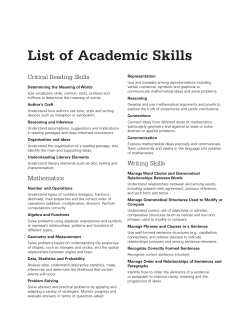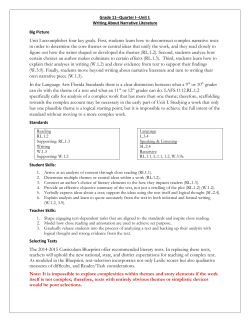
Writing Assignments for - Butler High Media Center
AP English Literature Summer Assignment for How to Read Literature Like a Professor by Thomas C. Foster You are to complete the small writing assignments for the chapters listed below from How to Read Literature Like a Professor. This assignment should be typed in MLA format (12 point Times Roman Font) and be ready to turn in the first week of class. If you don’t want to purchase the book, a PDF is available at http://www.aaps.k12.mi.us/huron.english/files/howtoreadliteraturelikeaprofessor_ft.pdf Please be sure you read the entire book, even though not every chapter has a writing prompt. There will be a test over the entire work and it will be referenced throughout the course. Introduction: How'd He Do That? How do memory, symbol, and pattern affect the reading of literature? How does the recognition of patterns make it easier to read complicated literature? Discuss a time when your appreciation of a literary work was enhanced by understanding symbol or pattern. Chapter 1 -- Every Trip Is a Quest (Except When It's Not) List the five aspects of the QUEST and then apply them to one of the novels you have read for summer reading. Chapter 2 -- Nice to Eat with You: Acts of Communion Choose a meal from a literary work and apply the ideas of Chapter 2 to this literary depiction. Chapter 3: --Nice to Eat You: Acts of Vampires What are the essentials of the Vampire story? Apply this to a literary work you have read (doesn’t have to be summer reading novel). Chapter 5 --Now, Where Have I Seen Her Before? Define intertextuality. Discuss three examples that have helped you in reading specific works. Chapter 6 -- When in Doubt, It's from Shakespeare... Discuss a work that you are familiar with that alludes to or reflects Shakespeare. Show how the author uses this connection thematically. Read pages 44-46 carefully. In these pages, Foster shows how Fugard reflects Shakespeare through both plot and theme. In your discussion, focus on theme. Chapter 8 -- Hanseldee and Greteldum Think of a work of literature that reflects a fairy tale. Discuss the parallels. Does it create irony or deepen appreciation? Chapter 10 -- It's More Than Just Rain or Snow Discuss the importance of weather in a specific literary work, not in terms of plot. Interlude -- Does He Mean That Chapter 11 --...More Than It's Gonna Hurt You: Concerning Violence Present examples of the two kinds of violence found in literature. Show how the effects are different. Chapter 12 -- Is That a Symbol? Use the process described on page 106 and investigate the symbolism in one of your summer reading novels. Chapter 15 -- Flights of Fancy Select a literary work in which flight signifies escape or freedom. Explain in detail. Chapter 16 -- It's All About Sex... Chapter 17 -- ...Except the Sex OK ..the sex chapters. The key idea from this chapter is that "scenes in which sex is coded rather than explicit can work at multiple levels and sometimes be more intense that literal depictions" (141). In other words, sex is often suggested with much more art and effort than it is described, and, if the author is doing his job, it reflects and creates theme or character. Choose a novel or movie in which sex is suggested, but not described, and discuss how the relationship is suggested and how this implication affects the theme or develops characterization. Chapter 19 -- Geography Matters… Discuss at least four different aspects of a specific literary work that Foster would classify under "geography." Interlude -- One Story Write your own definition for archetype. Then identify an archetypal story and apply it to a literary work with which you are familiar. Chapter 21 -- Marked for Greatness Figure out Harry Potter's scar. If you aren't familiar with Harry Potter, select another character with a physical imperfection and analyze its implications for characterization. Chapter 22 -- He's Blind for a Reason, You Know Chapter 23 -- It's Never Just Heart Disease... Chapter 24 -- ...And Rarely Just Illness Recall two characters who died of a disease in a literary work. Consider how these deaths reflect the "principles governing the use of disease in literature" (215-217). Discuss the effectiveness of the death as related to plot, theme, or symbolism. Chapter 25 -- Don't Read with Your Eyes After reading Chapter 25, choose a scene or episode from a novel, play or epic written before the twentieth century. Contrast how it could be viewed by a reader from the twenty-first century with how it might be viewed by a contemporary reader. Focus on specific assumptions that the author makes, assumptions that would not make it in this century. Chapter 26 -- Is He Serious? And Other Ironies Select an ironic literary work and explain the nature of the irony in the work. Chapter 27 -- A Test Case Read “The Garden Party” by Katherine Mansfield, the short story starting on page 245. Complete the exercise on pages 265-266, following the directions exactly. Then compare your writing with the three examples. How did you do? What does the essay that follows comparing Laura with Persephone add to your appreciation of Mansfield's story?
© Copyright 2025





















